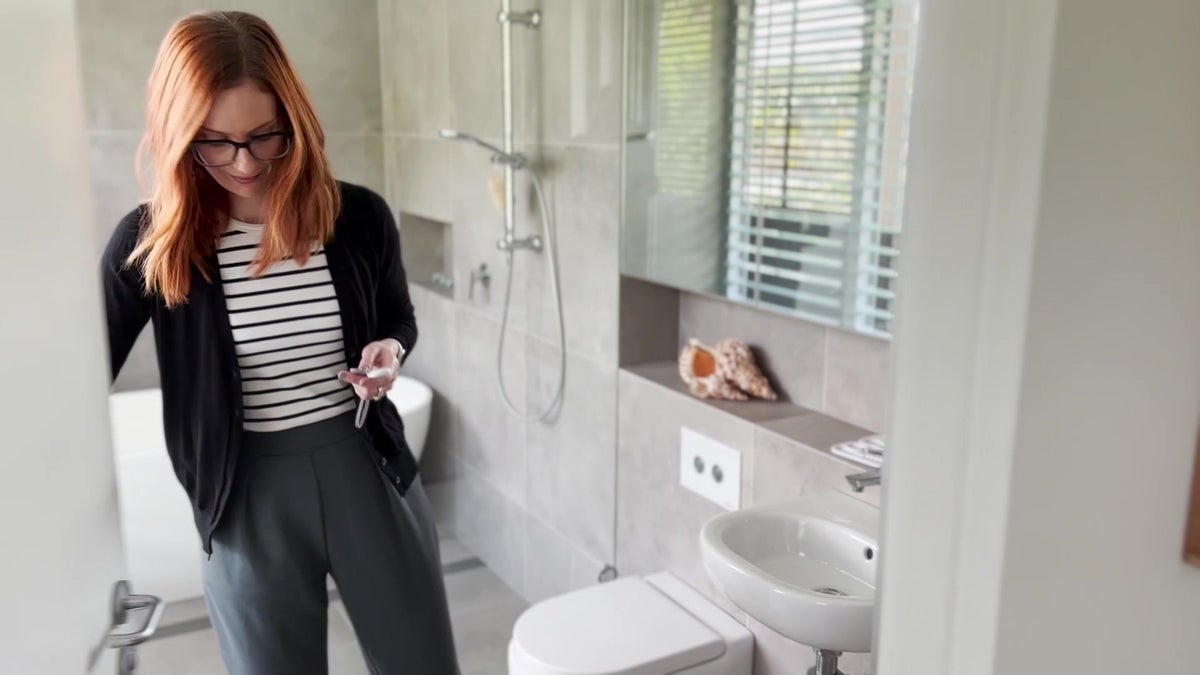
A mother left housebound by severe incontinence has revealed the simple fix that is giving her her life back.
Renee Brown was 39 when she was diagnosed with cervical cancer, and the combination of treatments left her with an embarrassing issue.
The mother-of-one struggled to make it to the toilet in time and if she did go out she would need to schedule in advance to ensure there was always a bathroom on hand.
Renee Brown battled cervical cancer in 2019 which left with her incontinence issues— (Jam Press/Renee Brown)
Now she has discovered the benefits of femfit, a sensor that when combined with a 10 minute exercise routine helps with retraining and strengthening the pelvic floor. For Renee, the results were game-changing after just a few weeks of use.
“The difference is like night and day,” Renee, from Victoria, Australia said. “I could actually feel not only that change when using the femfit app, but the change actually happening physically.
“I ended up having more control so that I could make it to the toilet in the morning. I could turn that tap on and not have to count sheep to try and distract my thoughts. It was starting to give me control back and the confidence that I can be in control. It was turning things the other way.”
The issue had been plaguing Renee since her cervical cancer diagnosis.
She underwent a pelvic lymph node removal procedure, then started chemotherapy, radiation therapy and internal radiation therapy.
But she believes the treatment caused the acute incontinence she then suffered – which at times meant she was unable to leave the house as she even leaked walking around the kitchen.
If she did venture out Renee was forced to plot her route ensuring there were public toilets within reach.
Within a few weeks of using femfit five times-a-week, Renee began to notice the leaking had stopped— (Jam Press/JUNOFEM)
Renee said: “It was often far more than a dribble and it was happening through the day. I frequently couldn’t even make it to the toilet when I woke up. It was incredibly debilitating.”
After unsuccessfully trying patches recommended by her gynaecologist she was advised to try an electromagnetic pad chair.
After initially yielding a positive outcome Renee realised having developed brittle bones from osteopenia caused by the radiation therapy, the chair was not a practical long-term option.
By chance, Renee spotted a bulletin from ‘Counterpart’ a female-led cancer counselling organisation, which was calling for participants in a research study at the University of Melbourne.
The research team recommended a ground-breaking pelvic floor training device called femfit, which at the time was only available in Australia and New Zealand.
Femfit consists of a thin flexible silicone sensor capable of visualising the activation of the pelvic floor muscles.
The sensor is temporarily inserted into the vagina for the duration of the pelvic floor exercising session – typically just 10 minutes.
A row of tiny pressure sensors located inside the sensor measures the strength of contraction of the user’s pelvic floor muscles, while simultaneously measuring abdominal pressure.
This information is transmitted wirelessly to a bespoke app on a user’s smartphone to provide real-time feedback guiding correct technique.
Users have reported dramatic improvements in incontinence issues both post-natal and in menopausal situations.
Renee was sent a femfit and access to remote telehealth sessions with the research physiotherapists.
Within a few weeks of using femfit five times-a-week, Renee began to notice the leaking had stopped.
She said: “The challenging exercise for me was the one going up and down quickly, the rapid contractions.
“That was my nemesis, the one that I was concentrating on, and I didnt realise until I started using the device that I was good at contracting my pelvic floor.
“But I was no good at relaxing between squeezing, and that exercise really brought this to life. I was just ‘locked on’.
“It was really, really phenomenal to see how much better I had got at that release.”
Renee is still facing some health challenges but she says, knowing she has a femfit, she can return to it at any time.
She added: “It sits on my bedside table so it’s there when I need it.”
Without guidance, many women get the pelvic floor exercise technique wrong. The only feedback is no improvement in symptoms after weeks of trying.
Effective technique is crucial for getting the benefits from the time committed to exercising.
Femfit is a single-person, reusable device available over-the-counter, for use in the home or in a healthcare clinic.
It can be worn daily with no restrictions on any kind of movement or activity.
If they choose, users can share their progress with their clinician directly from the app, and bridge the gap between appointments for ongoing, targeted support.
Powered by advanced biofeedback technology, the femfit system is the result of more than a decade of clinical research.
It is the only trainer on the market with the unique array of pressure sensors to provide precise feedback on technique.
It is the only trainer on the market that is slim and flexible. It is so comfortable that it can be used for training while lying, sitting or standing.
And the company’s 12-week ‘Strength Builder’ programme has been clinically proven to resolve up to 80 per cent of urinary incontinence symptoms - just one of the benefits from a healthy pelvic floor.
The femfit is battery-powered and recharges when placed in a USB-powered charging case.
Jenny Kruger of JUNOFEM, which makes femfit, added: “Renee’s story is remarkable and a testament to her courage and perseverance.
“We are delighted that Renee has had such a positive experience with femfit.
“Struggling with urinary incontinence, as a consequence of treatment for gynaecological cancer, is common.”
According to the World Cancer Research Fund, an estimated 1.31 million cases of gynaecological cancer worldwide were diagnosed in 2018.
The rates of urinary incontinence associated with many of the medical and surgical treatment of these conditions ranges from 4% to 77%, with daily incontinence being between 24% and 29%.
Jenny added: “Providing means or ways of assisting women to regain control over parts of their lives that have been hugely impacted, is of immense importance’ the telehealth option that Renee and her physiotherapist were able to access is a feature of femfit and is available.”
Jackie Smalldridge, Obstetrician and gynaecologist added: “Urinary incontinence is a common condition typically experienced by one in three women.
“One of our goals is to educate women that effective pelvic floor exercising can make a huge difference.”







